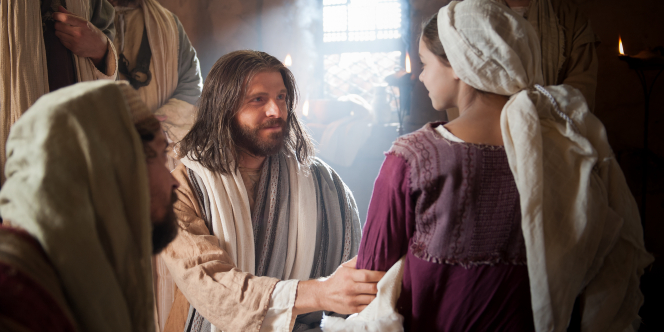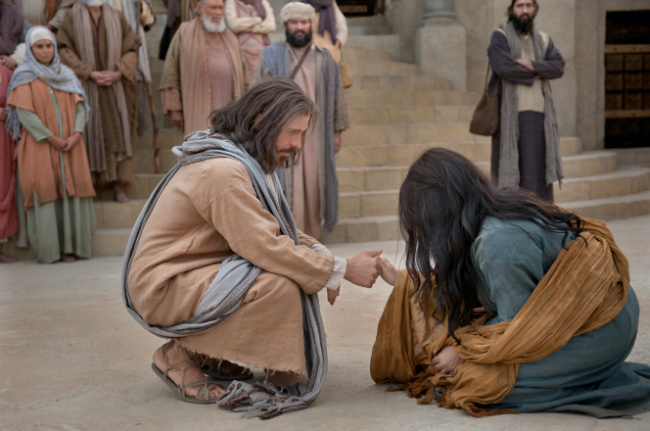
Many people seem to avoid the Old Testament because they view Jehovah as vengeful and full of fury. In the New Testament, as Jesus Christ, He taught people to love one’s enemies and forgive sinners, but still wreaked havoc on the merchants in the temple and castigated Pharisees as being hypocrites.
Is there a disconnect? Was Jesus nice?
I believe there isn’t a disconnect. Even setting aside His redeeming atonement for mankind, Jesus really was nice! He spent time with children, comforted friends, helped His mother, and always welcomed everyone–even when He was tired or planned to spend time alone. In fact, He said we are His primary focus and purpose! “For behold, this is my work and my glory—to bring to pass the immortality and eternal life of man” (Moses 1:39). His commandments enable our growth and progress. He knows the consequences of sin. He knows our capabilities. He knows what’s at stake. He expects our best effort.
I think C. S. Lewis explained the seeming paradox best in Mere Christianity:
Dozens of people go to Him to be cured of some particular sin which they are ashamed of (like physical cowardice) or which is obviously spoiling daily life (like bad temper or drunkenness). Well, He will cure it all right: but He will not stop there. That may be all you asked; but if once you call Him in, He will give you the full treatment.
That is why He warned people to ‘count the cost’ before becoming Christians. ‘Make no mistake; He says, ‘if you let me, I will make you perfect. The moment you put yourself in My hands, that is what you are in for. Nothing less, or other, than that. You have free will, and if you choose, you can push Me away. But if you do not push Me away, understand that I am going to see this job through. Whatever suffering it may cost you in your earthly life, whatever inconceivable purification it may cost you after death, whatever it costs Me, I will never rest, nor let you rest, until you are literally perfect-until my Father can say without reservation that He is well pleased with you, as He said He was well pleased with me. This I can do and will do. But I will not do anything less.’
Making Covenants Puts Us Into His Hands
Throughout the scriptures, the Lord focused on covenants, or promises between man and Him, that course-corrected man’s tendency to sin and inspired him to look to God for salvation.
When the earth was full of violence, Jehovah spoke to obedient Noah. He explained why the flood was imminent. He explained to Noah how to save himself, his family, and the creatures. “With thee will I establish my covenant; and thou shalt come into the ark, thou, and thy sons and thy wife, and thy sons’ wives with thee. … Thus did Noah; according to all that God commanded him, so did he” (Genesis 6:18, 22). Then, “God remembered Noah, and every living thing, and all the cattle that was with him in the ark: and God made a wind to pass over the earth, and the waters assuaged” (Genesis 8:1).
Noah and those who kept the covenant with God were saved. Those who did not perished. “Every man is tempted, when he is drawn away of his own lust, and enticed. Then when lust hath conceived, it bringeth forth sin: and sin, when it is finished, bringeth forth death” (James 1:14-15). But, even in their physical death, God provided means for their salvation. Peter recorded that after His death, Jesus Christ visited the spirit world, the place where the spirits of mankind go after death. “By which also he went and preached unto the spirits in prison; Which sometime were disobedient, when once the longsuffering of God waited in the days of Noah…wherein few, that is, eight souls were saved” (1 Peter 3:19-20). Isn’t that the ultimate nicety? To keep offering salvation even after someone has self-destructed?
Jesus Is So Nice That He Expects Perfection…and Stumbling
Again from Mere Christianity:
And yet – this is the other and equally important side of it – this Helper who will, in the long run, be satisfied with nothing less than absolute perfection, will also be delighted with the first feeble, stumbling effort you make to-morrow to do the simplest duty. As a great Christian writer (George MacDonald) pointed out, every father is pleased at the baby’s first attempt to walk: no father would be satisfied with anything less than a firm, free, manly walk in a grown-up son. In the same way, he said, ‘God is easy to please, but hard to satisfy.’
The practical upshot is this. On the one hand, God’s demand for perfection need not discourage you in the least in your present attempts to be good, or even in your present failures. Each time you fall He will pick you up again. And He knows perfectly well that your own efforts are never going to bring you anywhere near perfection. On the other hand, you must realise from the outset that the goal towards which He is beginning to guide you is absolute perfection; and no power in the whole universe, except you yourself, can prevent Him from taking you to that goal. That is what you are in for. And it is very important to realise that. If we do not, then we are very likely to start pulling back and resisting Him after a certain point. I think that many of us, when Christ has enabled us to overcome one or two sins that were an obvious nuisance, are inclined to feel (though we do not put it into words) that we are now good enough. He has done all we wanted Him to do, and we should be obliged if He would now leave us alone. As we say ‘I never expected to be a saint, I only wanted to be a decent ordinary chap.’ And we imagine when we say this that we are being humble. …
We may be content to remain what we call `ordinary people’: but He is determined to carry out a quite different plan. To shrink back from that plan is not humility; it is laziness and cowardice. To submit to it is not conceit or megalomania; it is obedience.
That is why we must not be surprised if we are in for a rough time. When a man turns to Christ and seems to be getting on pretty well … When troubles come along – illnesses, money troubles, new kinds of temptation – he is disappointed. These things, he feels, might have been necessary to rouse him and make him repent in his bad old days; but why now? Because God is forcing him on, or up, to a higher level: putting him into situations where he will have to be very much braver, or more patient, or more loving, than he ever dreamed of being before. It seems to us all unnecessary: but that is because we have not yet had the slightest notion of the tremendous thing He means to make of us.
I find I must borrow yet another parable from George MacDonald. Imagine yourself as a living house. God comes in to rebuild that house. At first, perhaps, you can understand what He is doing. He is getting the drains right and stopping the leaks in the roof and so on: you knew that those jobs needed doing and so you are not surprised. But presently he starts knocking the house about in a way that hurt abominably and does not seem to make sense. What on earth is He up to? The explanation is that He is building quite a different house from the one you thought of-throwing out a new wing here, putting on an extra floor there, running up towers, making courtyards. You thought you were going to be made into a decent little cottage: but He is building a palace. He intends to come and live in it Himself.
Consider Daniel, Shadrach, Meshach, and Abednego. After being carried off to Babylon, they found themselves in the king’s court to be trained by Nebuchadnezzar’s finest. Right off the bat, they face a horrific obstacle: obey the Lord’s law of health, or quietly acquiesce to the king’s requirement. God knew they were in captivity, right? Wouldn’t He understand their peril?
“But Daniel purposed in his heart that he would not defile himself with the portion of the king’s meat, nor with the wine which he drank: therefore he requested of the prince of the eunuchs that he might not defile himself” (Daniel 1:8). Worried for his own life, the prince of the eunuchs pushed back until Daniel asked for a 10 day test. After 10 days, Daniel and friends looked healthier than the others eating the king’s meat. Then came the covenant’s blessing. “As for these four children, God gave them knowledge and skill in all learning and wisdom: and Daniel had understanding in all visions and dreams” (Daniel 1:17).
But, soon to come for Shadrach, Meshach, and Abednego was the commandment to pray before Nebuchadnezzar’s golden idol and the fiery furnace, and for Daniel the law against prayer and the lion’s den. Though in imminent physical danger, and being unfathomably stretched towards perfection, they remembered their covenant with God and were saved from the fiery furnace and the lion’s den.
Jesus Is So Nice That He Want Us To Become Like Himself
And lastly from Mere Christianity:
The command Be ye perfect is not idealistic gas. Nor is it a command to do the impossible. He is going to make us into creatures that can obey that command. He said (in the Bible) that we were ‘gods’ and He is going to make good His words. If we let Him – for we can prevent Him, if we choose – He will make the feeblest and filthiest of us into a god or goddess, a dazzling, radiant, immortal creature, pulsating all through with such energy and joy and wisdom and love as we cannot now imagine, a bright stainless mirror which reflects back to God perfectly (though, of course, on a smaller scale) His own boundless power and delight and goodness. The process will be long and in parts very painful; but that is what we are in for. Nothing less. He meant what He said.
Throughout the scriptures people, stepped up to the challenge, and either asked or answered defining questions. He responded with growth promoting, soul piercing statements. Each person then HAD to choose whether to accept His way towards perfection or not.
I wish I could always know the rest of the story, but realize that the rest of the story isn’t necessarily the point in most cases. The point is to recognize those defining moments throughout the scriptures–to see how the Savior encouraged, reached, and lifted–and then recognize those moments in my own life. Following are examples of a few scriptural moments. I only included the Savior’s voice, but challenge you to review the references to discover the defining moment for each person. Even a cursory review demonstrates how nice Jesus is when offering saving counsel.
Woman taken in adultery: “And Jesus said unto her, neither do I condemn thee: go, and sin no more” (John 8:11).
Nicodemus: “Jesus answered, Verily, verily, I say unto thee, Except a man be born of water and of the Spirit, he cannot enter into the kingdom of God” (John 3:5).
The rich young ruler: “Then Jesus beholding him loved him, and said unto him, One thing thou lackest: go thy way, sell whatsoever thou hast, and give to the poor, and thou shalt have treasure in heaven: and come, take up the cross, and follow me” (Mark 10:21).
Woman at the well: “But whosoever drinketh of the water that I shall give him shall never thirst; but the water that I shall give him shall be in him a well of water springing up into everlasting life” (John 4:14).
Brother of Jared: “Yea, even all men were created in the beginning after mine own image. Behold this body, which ye now behold, is the body of my spirit; and man have I created after the body of my spirit; and even as I appear unto thee to be in the spirit will I appear unto my people in the flesh” (Ether 3:15-16).
Moses: “And God said moreover unto Moses, Thus shalt thou say unto the children of Israel, The LORD God of your fathers, the God of Abraham, the God of Isaac, and the God of Jacob, hath sent me unto you: this is my name for ever, and this is my memorial unto all generations” (Exodus 3:15).
Judas: “And Jesus said, …she hath wrought a good work on me. … She is come aforehand to anoint my body to the burying” (Mark 14:6,8).
Peter: “Jesus saith unto him, Feed my sheep” (John 21:17).
Nephi: “The Spirit cried with a loud voice, saying: Hosanna to the Lord, the most high God; for he is God over all the earth, yea, even above all. And blessed art thou, Nephi, because thou believest in the Son of the most high God; wherefore, thou shalt behold the things which thou has desired” (1 Nephi 11:6).
Saul: “And he said unto me, I am Jesus of Nazareth, whom thou persecutest” (Acts 22:8).
Joseph Smith: “When the light rested upon me I saw two Personages, whose brightness and glory defy all description, standing above me in the air. One of them spake unto me, calling me by name and said, pointing to the other—This is My Beloved Son. Hear Him!” (Joseph Smith History 1:15).
Jesus Is So Nice That He Approaches Us Individually
For me, it is significant that each encounter with Diety is uniquely tailored specifically to that individual. That is evidence that Jesus was nice to them and is nice to us, because not only does He want to perfect us, but He knows me, you, everyone intimately and deeply. He loves us. He knows our strengths, weaknesses, habits, secrets, fears, and hopes. He never tramples on our choice. He waits until we ask and then He teaches. He reaches down and deep within our soul and we feel the wonderful, uncomfortable possibilities.
Again, in case you’ve forgotten…
He says, ‘if you let me, I will make you perfect. The moment you put yourself in My hands, that is what you are in for. Nothing less, or other, than that. You have free will, and if you choose, you can push Me away. But if you do not push Me away, understand that I am going to see this job through. Whatever suffering it may cost you in your earthly life, whatever inconceivable purification it may cost you after death, whatever it costs Me, I will never rest, nor let you rest, until you are literally perfect-until my Father can say without reservation that He is well pleased with you, as He said He was well pleased with me. This I can do and will do. But I will not do anything less.’
He can do it. He will do it. He wants to do it. Because He is nice.












